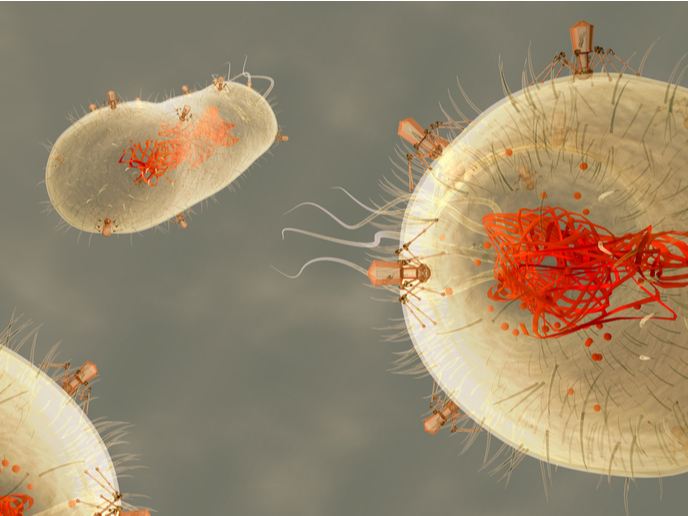Exploring antibiotic resistance, bacteria and the viruses that eat them
A recent study(opens in new window) supported by the EU-funded EPICut and EVOIMMECH projects has cast new light on the use of viruses called bacteriophages to treat bacterial infections. Bacteriophages, or simply phages, are harmless to humans, only attacking bacteria. When used together with antibiotics, they have been found to be more effective in curing infections while also giving bacteria fewer chances to develop antibiotic resistance. However, bacteria can become resistant to phages. Published in the journal ‘Cell Host & Microbe’, the study provides valuable insight on optimally combining phage therapy and antibiotics. Bacteria are not helpless when attacked by phages. When the viruses infect bacteria by penetrating molecules on the cell surface, this prompts bacteria to activate their defence system – a family of DNA sequences called clustered regularly interspaced short palindromic repeats (CRISPR). CRISPR sequences originate from DNA fragments of phages that had previously infected the bacteria and are used to detect and destroy DNA from similar phages that subsequently infect it. Bacteria also defend themselves by changing their cell surface and removing the receptor that phages usually attach to. However, this eliminates their ability to cause disease, or results in milder disease.
Testing bacterial response to antibiotics and phages
In their study, the EU-backed researchers conducted lab experiments on Pseudomonas aeruginosa, a bacterium known to cause pneumonia, as well as blood and other infections in humans. Unfortunately, in healthcare, Pseudomonas aeruginosa infections are becoming increasingly difficult to treat due to rising antibiotic resistance. The scientists exposed the bacterium to eight different antibiotics and spotted variations in the way the bacterium developed resistance to phages, affecting the bacteria’s virulence. Four of the eight antibiotics tested led to a marked increase in the bacteria’s CRISPR-based immunity levels. All four antibiotics were bacteriostatic, meaning that they inhibited bacterial cell growth without killing the cells. The researchers showed that the elevated CRISPR immunity triggered by bacteriostatic antibiotics is a result of slower phage development inside the bacterial cell, giving the cell more time to acquire phage DNA sequences and mount an immune response. “Antibiotic resistance is a major public health issue, and we need to take swift and urgent action,” remarks study senior author Prof. Edze Westra of EPICut project partner and EVOIMMECH project host University of Exeter, United Kingdom, in a news item(opens in new window) posted on the university’s website. “Phage therapy could be an important part of the toolkit, in reducing antibiotic use, and in using them in combination to increase their efficiency. We found that by changing the type of antibiotics that are used in combination with phage, we can manipulate how bacteria evolve phage resistance, increasing the chances that treatment is effective. These effects should be considered during phage-antibiotic combination therapy, given their important consequences for pathogen virulence.” The study supported by EPICut (Molecular mechanisms, evolutionary impacts and applications of prokaryotic epigenetic-targeted immune systems) and EVOIMMECH (The evolutionary ecology of bacterial immune mechanisms) “provides fundamental insight into the constraints of CRISPR immune systems in the face of viruses,” according to lead author Dr Tatiana Dimitriu, also of the University of Exeter. “It was recently discovered that many CRISPR-Cas immune systems are associated to cell responses that make bacteria slow or stop growth upon phage infection, and we speculate that this may be important for cells to trigger an effective immune response.” For more information, please see: EPICut project(opens in new window) EVOIMMECH project(opens in new window)



